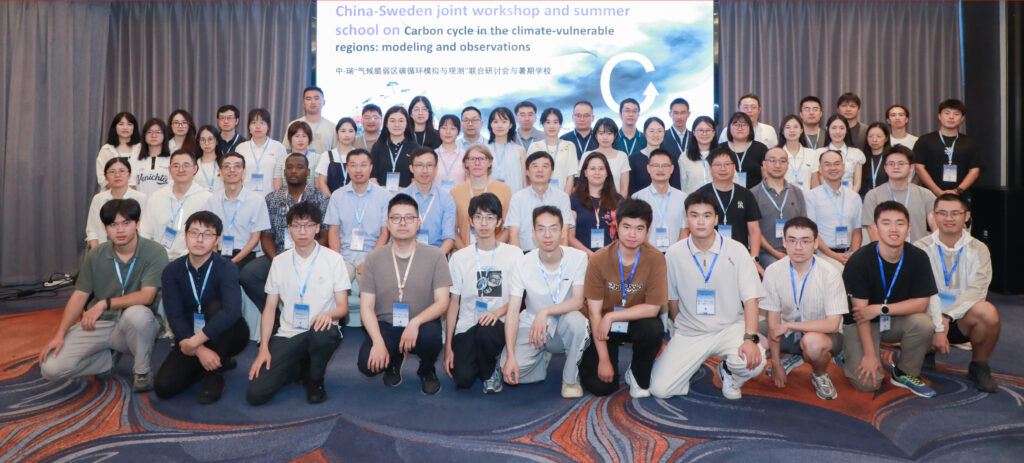-
Welcome our newest group members: Fangyuan Cheng and Xinyu Yang
The Climate Dynamics Group has two new members:
- Fangyuan Cheng, PhD student
- Xinyu Yang, postdoc
They will both work with research related to climate variability & change, extreme events, and socioeconomic impacts. See their member pages for more information.
Warmly welcome!
-
Some new publications in 2025
2025 has been a busy year with not much time to write news for the website. Here’s a summary of some new publications that haven’t been mentioned here yet, including two led by Ziqian Zhong:
- Ye et al. (2025): Attributing climate and weather extremes to Northern Hemisphere sea ice and terrestrial snow: progress, challenges and ways forward
- Liu et al. (2025): Changes in atmospheric circulation amplify extreme snowfall fueled by Arctic sea ice loss over high-latitude land
- Peng et al. (2025): Characterizing spatial variability of soil organic carbon through improved machine-learning modeling with in situ data resampling: A case study in Alaska
- Zhong et al. (2025): Contrasting vegetation productivity responses in arid and humid zones to recent changes in diurnal temperature range
Wildfire:
- Chen et al. (2025): Divergent radiative forcing of fine-mode aerosols across tree genera during wildfires in North America and Europe
- Xu et al. (2025): The critical role of snowmelt onset-driven vapor pressure deficit variations in wildfire dynamics of northern latitudes
- Zou et al. (2025): Amplified urban heat island effect in southern China’s old towns following atmospheric regulation policies
- Zhong et al. (2025): Sub-diurnal asymmetric warming has amplified atmospheric dryness since the 1980s
-
Second NSFC–STINT workshop and first summer school
This summer we organized the second in-person NSFC–STINT workshop on “Carbon cycle in the climate-vulnerable regions: modeling and observations” in Nanjing, China. This time, the workshop was complemented by a summer school, providing early-career scientists with hands-on training in running three cutting-edge ecosystem modeling systems: the Terrestrial Carbon Community Assimilation System (TCCAS), Biosphere–atmosphere Exchange Process Simulator (BEPS), and Nanjing University Carbon Assimilation System (NUCAS). There were also lectures on the Global Carbon Assimilation System (GCAS) and machine learning applications in carbon cycle research.

Participants in the NSFC–STINT workshop and summer school The workshop and summer school attracted a large and diverse group of participants, and generated lively discussions across disciplines.
-
New publication on Arctic warming and wetting
Hans Chen is a co-author on a new paper published in Science Advances. This study applies the emergent constraint method to constrain projected Arctic warming and wetting based on historical global warming trend and climatological Arctic sea ice concentration.
- Cai et al. (2025): Lessened projections of Arctic warming and wetting after correcting for model errors in global warming and sea ice cover
-
Article about recent California wildfires
Hans Chen has been interviewed by Källkritikbyrån about the recent wildfires in California and the links to climate change and increasing “hydroclimate whiplash”:
-
Recent paper on volcanic eruptions and wind energy featured on the cover of The Innovation
A recent paper co-authored by Hans Chen is featured on the cover of the relatively new open-access journal The Innovation. The paper, led by Cheng Shen, investigates the effect of strong tropical volcanic eruptions on near-surface wind speed globally.
- Shen et al. (2025): A robust reduction in near-surface wind speed after volcanic eruptions: Implications for wind energy generation.

Update 2025-02-06: The Guardian has reported on the study:
-
Welcome Hari to the group!
Hari Nair recently joined our group as a postdoc. Hari will primarily work on a project exploring the changing carbon cycle dynamics in the Arctic climate system, financed by the Hasselblad Foundation.
-
Wrapping up 2024 with new papers
Happy 2025! We close out 2024 on a high note with some new exciting research:
Machine learning and aerosols:
- Yan et al. (2024): Deep learning with pretrained framework unleashes the power of satellite-based global fine-mode aerosol retrieval.
- Yan et al. (2024): Substantial underestimation of fine-mode aerosol loading from wildfires and its radiative effects in current satellite-based retrievals over the United States.
Carbon cycle and ecosystem dynamics:
- Xu et al. (2024): Global patterns and drivers of post-fire vegetation productivity recovery.
- Li et al. (2024): Increasing sensitivity of tree radial growth to precipitation.
-
Presentation at Stora Hållbarhetsdagen Göteborg
Hans Chen will give the opening talk at Stora Hållbarhetsdagen Göteborg (“The Big Sustainability Day Gothenburg”) about the current climate situation. The event is arranged by Fastighetssverige.

Date: 21 November 2024
Location: Clarion Hotel Draken
More information: https://fastighetssverige.se/stora_hallbarhetsdagen_goteborg -
New paper investigating the effects of vegetation physiological response on climate zone shifts
We have recently published a paper that investigates how global Köppen–Geiger climate zones are projected to shift under 4×CO2, with a special focus on the effect of vegetation physiological changes, which have been largely neglected so far. You can find the paper in Science of The Total Environment:
- He et al. (2024): Vegetation increases global climate vulnerability risk by shifting climate zones in response to rising atmospheric CO2.